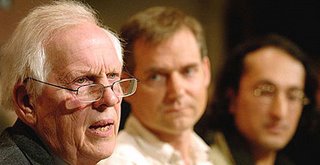 It's been an absolute pleasure and privilege to work with former Iraq hostages Norman Kember, Jim Loney and Harmeet Singh Sooden over the past 72 hours. Jim and Harmeet came to London to meet up with Norman, and to make a media statement that clarified why they feel that forgiveness and restorative justice are the way forward in relation to the men who captured them and held them prisoner for 118 days. Ekklesia was honoured to be asked to coordinate the media bids and yesterday's press conference, and the resulting coverage has mainly been pretty positive so far - recognising the integrity of the men's position and the challenge their action poses to the terrible cycles of violence which have been ripping Iraq apart - as Jim said, during the years of Saddam's brutal dictatorship, and then in the context of US-led war and occupation and the horrific aftermath - 3,000 deaths a month, and some thousand people fleeing every day.
It's been an absolute pleasure and privilege to work with former Iraq hostages Norman Kember, Jim Loney and Harmeet Singh Sooden over the past 72 hours. Jim and Harmeet came to London to meet up with Norman, and to make a media statement that clarified why they feel that forgiveness and restorative justice are the way forward in relation to the men who captured them and held them prisoner for 118 days. Ekklesia was honoured to be asked to coordinate the media bids and yesterday's press conference, and the resulting coverage has mainly been pretty positive so far - recognising the integrity of the men's position and the challenge their action poses to the terrible cycles of violence which have been ripping Iraq apart - as Jim said, during the years of Saddam's brutal dictatorship, and then in the context of US-led war and occupation and the horrific aftermath - 3,000 deaths a month, and some thousand people fleeing every day.Still, it is salutary to be reminded that some sections of the media not only don't get it (comment is, rightly, free) but appear rather more interested in what will make 'a good story' than what is actually the case (fact is rarely determinative of journalistic construction these days). For example, here is Norman Kember - writing in today's Daily Telegraph, and re-iterating what the three Christian Peacemakers have been saying again and again for much of the past two days: "Although we are all absolutely opposed to the death penalty, we do not have, at present, enough information about the working of the Iraqi court system to discover if we can best help these men by refusing to testify, and asking for clemency outside the court system, or by agreeing to take part in the trial and ask[ing] for clemency within the court process." And here's how that was translated in The Guardian (surprisingly) Former Iraq hostages refuse to give evidence against captors in trial and (more predictably) in The Times Kember: I will not testify at trial of my kidnappers. Also: Hostages explain refusal to testify (ABC Online, Australia). As they say, "spot the difference". The Guardian, to its credit, ran additional stories: Kember pleads clemency for his kidnappers and Former hostage forgives captors. Mostly, the emphasis of coverage has been on forgiveness and restoration - but as Jim Loney has been at pains to point out, that doesn't necessarily mean unwillingness to testify, and it certainly doesn't mean a simple 'bang them up or let them free' choice - it is about seeking the middle round where rehabilitation and change remains possible.
Comment on this post: FaithInSociety

No comments:
Post a Comment